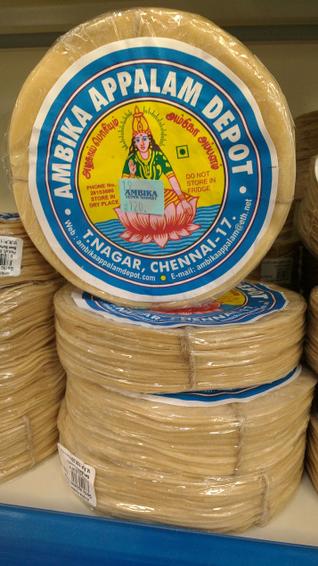It began in a small household in Triplicane… Here’s the story of Ambika Appalam, established long before the Second World War

They say the trick to achieving the perfect appalam lies in the hands of the maker. The process is referred to as appalam ‘iduradhu’ — a Tamil word that doesn’t have an exact English equivalent. Shaping, perhaps? It is a task that requires far more than a machine’s precision. Which is why at Ambika Appalam, every appalam is still hand-made. “I spent lots of money in R&D on making them with machines,” says K.V. Vijayaraghavan, who owns the company. “But I was not successful. Something or the other would go wrong if a machine was employed. The dough wouldn’t be right or the appalam would turn brown when fried.”
Ambika Appalam owes its legacy to a man called Ayappan, about whom the present generation that runs the company knows little. “All I’ve heard about him is from my father K.A. Velayudham. Poverty forced Ayappan, my grandfather, to come from Kerala to Madras to make a living,” remembers Vijayaraghavan.
This was in the 1920s. Far from home, Ayappan started with what most of his neighbours in Triplicane did — making papadums. A little moist before being fried, a papadum puffed up like a poori when it came into contact with hot oil.
And so the young Ayappan, barely into his twenties, made dough using urad dal and shaped it into little circles. Although they cost just a few annas, each one was handled with care. He sun-dried them, packed them into bundles of 100, and arranged the lot in a bag. This marked step-1. Step-2, the more difficult one, consisted of Ayappan journeying with his precious cargo to various houses in the area to sell them.
The business gradually developed, and Ayappan married and started a family. His wife and children then joined him in making papadums at home.
Soon, Velayudham took over. He made appalams instead, for the lifespan of an appalam was up to a year, but that of a papadum was just seven days. It was Velayudham who gave his family business a brand and an identity — he named it Ambika, after his favourite goddess back home in Kerala. An artist in the neighbourhood sketched their logo — a line drawing of a goddess seated on a lotus. Even today, the same logo with the tagline ‘Azhagaai porium’, meaning ‘Fries beautifully’, adorns their wrappers, except that it has been embellished with technology.
Velayudham ferried appalams in a cycle to not just households in Triplicane, but to those as far as Tambaram. “My father then opened a small shop in Mathala Narayanan Street in Mylapore,” says Vijayaraghavan. It was “just enough for one person to stand amidst the appalam bundles.” From then on, Ambika grew much like a dream business, with Velayudham opening one shop after the other across the city.
They did have a hitch. In 1966, the business was shut down due to labour issues. “We had about 600 people working for us then. They would work from 3 a.m. to 7 p.m. in three houses in Triplicane that doubled as their workplace,” recalls Vijayaraghavan. Suddenly, it was all over. But they bounced back, with well-wishers who worked for them, offering to make appalams for them in their respective households.
It’s this model that the company follows till date — apart from their factory in Choolaimedu, their appalams are made in households across Chennai and Kanchipuram as per Vijayaraghavan’s specifications.
The crispy appalam that reaches our plate is extremely delicate in its initial stage. “If the maker grips a just-shaped appalam hard, it might break. But if not held properly, it might slip and lose shape,” says Vijayaraghavan. “This is why they stack the circles and pat it together. This is tricky too, for the circles might stick.”
Vijayaraghavan has various memorable customers – Kavignar Kannadasan among them. “He would buy an entire tin,” recalls Vijayaraghavan. The poet was a huge fan of Ambika’s potato chips.
source: http://www.thehindu.com / The Hindu / Home> Features> MetroPlus / by Akila Kannadasan / Chennai – March 15th, 2016